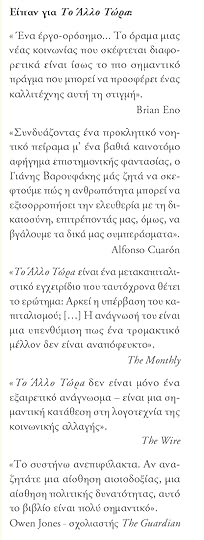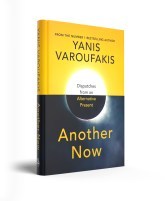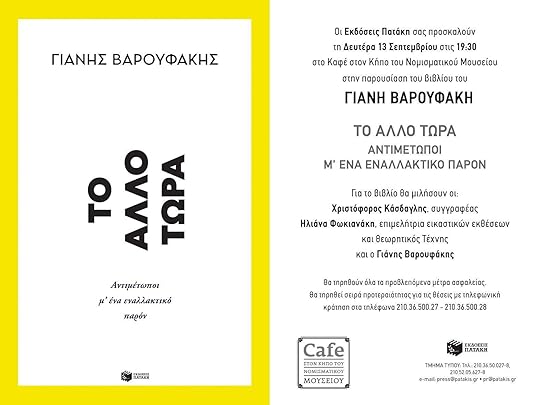Recently,
I argued that a central bank cryptocurrency can be a useful tool in the struggle to democratise money. Such a tool is, of course, not enough. The main task in democratising money is first to democratise the central bank – before deploying useful instruments like a central bank cryptocurrency. As many readers (correctly) pointed out, democratising the central bank is a tall order, given the stranglehold over it by the usual bankers. However, it is a gross error to imagine that the central bank can be bypassed and money democratised by means of apolitical cryptocurrencies like bitcoin. This fantasy of apolitical money liberating us from central banks is dangerous and based on a deep misunderstanding over what money is and how it works. To make the point, I am sharing here Chapter 7 of
TALKING TO MY DAUGHTER (Penguin 2017). I hope you enjoy it.Before reading on, let me recap the main point:First, the demos must wrest control over the central bank from the bankers.Then, a central bank cryptocurrency is deployed to democratise the payments’ system and ensure that the money tree is harvested for the many, not the very, very few!Chapter 7, TALKING TO MY DAUGHTERDuring the Second World War, the German authorities treated their prisoners of war differently, according to where they came from. Russians, the Roma, and certainly the Jews, they murdered. British, Canadian, American and French prisoners of war, on the other hand, they accorded to basic rights laid down by the internationally agreed Geneva Conventions.In 1941, Richard Radford, an officer in the British Army, was captured by German forces and placed in a concentration camp for Western prisoners of war. When the war ended, Radford took the time to record his experience of life in the POW camp through the prism of his training as an economist.In the camp, prisoners of different nationalities were kept in different buildings, between which they were usually free to move about. The Red Cross oversaw their living conditions and supplied them with packages at regular intervals from its Swiss headquarters. These packages typically contained food, cigarettes, some coffee, tea, a bar of chocolate and so on.The arrival of the Red Cross packages broke the monotony of life in the camp and was eagerly anticipated, especially by the smokers. Even though the prisoners’ preferences varied considerably, in a rare instance of strict equality the packages were identical for all prisoners,. The first to spot the opportunity to profit from these differences in taste were some shrewd French officers. Knowing that the average Frenchman loves coffee and doesn’t care much for tea, while the opposite held for the average Englishman, they established a regular exchange of goods between prisoners of various nationalities.Once the Red Cross truck had unloaded its cargo, the ingenious French traders approached their countrymen, borrowing from them the tea contained in their packages and promising an amount of coffee in return. Then they went to the building where the British prisoners were held and exchanged the tea for coffee, which they then returned to their French compatriots as they had promised. But why do this? What was in it for them?The French traders’ gain took the form of coffee that they kept for themselves. How did they get away with it? By offering their compatriots less coffee for their tea than the Englishmen were prepared to hand over in exchange of that same quantity of tea.
ArbitrageIn economic terms, the French traders were effectively paying their countrymen a lower price for the tea they bought from them than the price they charged the tea-loving Englishmen. Of course, the price was measured – or
denominated – not in pounds, marks or dollars, since the inmates of the camp had no actual money, but in ounces of coffee. In economic parlance, this practice of buying for a lower price in one market and selling for a higher price in another is called
arbitrage.Others quickly caught on and started doing the same. The greater the competition between them, the smaller the difference became between the quantity of coffee offered to the French prisoners in return for their tea and the quantity of coffee the Englishment forked out for the tea they received in exchange. This difference – or
spread – was where the traders’ profit lay. The smaller the spread, the less profit they made. Consider Pascal, a late-comer in this business. To convince his compatriots to give their tea to him and not to one of his more established competitors, Pascal is forced to offer them more coffee than they might normally receive in exchange for the same amount of tea. It is as if he is offering them a higher price for their tea. As others follow Pascal, in order to gain or retain a foothold in the market, the price of tea in the French camp continues to rise, squeezing the traders’ (coffee) profits further.At the same time, of course, the same bargaining over prices is taking place in the English camp, until finally it becomes common knowledge in the French camp how much coffee their tea will buy in the English camp and it becomes common knowledge in the English camp how much tea their coffee will buy in the French camp.At this point, Pascal and all the other French traders can no longer get away with paying a little bit less coffee for their compatriots tea than they receive from the English – everyone knows what their tea and coffee is worth. In other words, thanks to their efforts, the traders have helped establish the price of tea and, in the process, they have done themselves out of a job.Very quickly, all sorts of goods were being traded across the camp, with most of the POWs participating in this spontaneous, multinational market in which each person sought to acquire as many comforts as they could in the camp’s adverse conditions. As trade between prisoners developed, prices for all sorts of goods stabilised around what economists like to refer to as an
equilbirum. Before the equilibrium had been reached, traders profitted according to their bargaining skills and salesmanship – one might buy a chocolate bar for 10 grams of coffee, while another might manage to sell a chocolate bar for 15 grams of coffee – but as trading continued and competition shrank the spreads, prices stabilised, profits collapsed and skilled traders lost all advantage. Now they had to conjure up new types of trade – new ‘markets’, in other words – if they were to exploit their trading skills.This stabilisation of exchange values, or of relative prices, was helped along by the presence of noticeboards around the camp on which traders posted offers: for example, “I’m selling 100 grams of coffee for 10 chocolate bars”. In this way, prisoners could see at a glance the sort of prices that were available and would know not to accept 9 chocolate bars for the same amount of coffee, thus helping to establish stable prices all over the camp. Have you noticed in movies or on TV those large screens that traders have in the trading rooms of banks or the stock exchange? These are so-called Bloomberg screens, on which the shifting prices for oil, gold, company shares and government bonds appear in real time, and they are but more advanced versions of the noticeboards in Radford’s POW camp. Their job is to facilitate trade and to eliminate spreads, getting rid of opportunities for arbitrage in the process.
The emergence of a carcenogenic currency: cigarettesIn time, transactions in the camp became more complicated and the system of direct exchanges – tea for coffee, coffee for chocolate – was proving a drag.Imagine, for example, that a Canadian is offering 100 grams of coffee in exchange for 10 bars of chocolate. A Frenchman who wants the coffee, doesn’t have any chocolate but does have tea would have to do some research before proposing something like the following: “I want your coffee, but I don’t have chocolate. I do have tea, though, and I know this Scottish guy in building C5 who is offering 15 grams of tea per chocolate bar. So who about you give me that 100 grams of coffee and in return I give you 150 grams of tea, which you can then exchange with the Scotsman for 10 bars of chocolate?”That’s how things were in the beginning. But soon, a significant change came about: one particular commodity became established as a go-between that could mediate the sale of all he other commodities – in effect, it became a currency.Obviously, cigarettes were amongst the best-selling goods in the camp. Smokers, courtesy of their addiction to nicotine, would sell their soul to the Devil, so to speak, to get more of them. Non-smokers were, as a result, at a great advantage, since their package contained cigarettes too; cigarettes that had no experiential value for them, but packed great exchange value. Immediately, cigarettes were in great demand both for their experiential value (to smokers) and for their exchange value (to everyone, including non-smokers).It was only a matter of time before cigarettes were established as the unit for measuring exchange values, or relative prices, in the camps. Why cigarettes? Which goods end up evolving into a unit of currency has always depended partly on chance and partly on their having some basic properties: It must be durable so that it does not perish, unlike say bread or fish. It must be convenient to carry, preferably pocket sized. It must be easily divisible into smaller portions. And its appeal must be evenly spread throughout the community.Radford’s account relates how cigarettes transformed from a simple, carcinogenic good into a special commodity with three distinct properties and roles. First, they were sources of the nicotine that smokers craved. Second, they functioned as a means of exchange and a measure allowing for an easy, immediate, comparison of prices. Third, cigarettes could now be stashed away, offering prisoners the opportunity to create a nest egg of exchange value in the harsh conditions of the POW camp.This last use of cigarettes, as a store of exchange value, is perhaps the most interesting as its repercussions extended beyond the realm of convenience and trade facilitation: By giving prisoners the opportunity to save for a rainy day, new opportunities and new risks emerged. One obvious opportunity was the possibility of lending one’s saved cigarettes to another prisoner in return for interest. The risk that this brought was the possibility that the borrowing prisoner might not pay them back, known as the risk of
default. For example, the borrower might spend all his cigarettes – or even smoke them all – and be unable to return them to the creditor.But another risk came from elsewhere.
The exchange value of money: inflation and deflation in the POW campWhen I was your age I recall hearing a grown up saying something that I could not get my head around. I just did not get it, however hard I tried. Even when I thought I had understood it, I tried to explain it to a friend and realised that I didn’t. What was is that this grown up had said? That a one thousand drachma note (the currency we had back then) cost only twenty drachmas to produce. “How can it be worth a thousand drachmas,” I kept wondering, “when it only cost twenty?”Maybe you are smarter than I was but humour me nevertheless as I attempt to explain this puzzle in the context Radford’s POW camp: Periodically, the Red Cross would place a few more cigarettes in the prisoners’ packages, but keep the quantity of chocolate, tea or coffee the same. Here’s what happened when the extra cigarettes arrived at the camp: Each cigarette now bought less coffee, less chocolate, and less tea. Why? Since overall a larger number of cigarettes now corresponded to the same amount of coffee and tea, each individual cigarette corresponded to less coffee and less tea. The opposite also held true: the fewer cigarettes there were in comparison to the other goods that the Red Cross placed in the packages, the greater the exchange value, or purchasing power, of each cigarette. In short, the purchasing power of a unit of currency has nothing to do with how much it cost to produce but, rather, its relative abundance or scarcity.Imagine that a prisoner has been storing his cigarettes in order to make a large purchase later on when suddenly the Red Cross sends tons of cigarettes to the captives. Suddenly, the exchange value of his cigarettes would drop and his parsimony and abstinence would have been to no avail.In this way we see how having access to a currency lubricates transactions no end, helping the economy move more commodities more quickly. On the other hand, for a currency to function it requires trust and faith: the trust that everyone will continue to accept it in return for any commodity, which is in turn based on the faith that the currency’s exchange value will be maintained. It is no coincidence that in your second language, Greek, the word for ‘coin’ (
nomisma) straddles the verb ‘to think’ (
nomizo) and the noun for ‘law’ (
nomos). Indeed, what gives value to coins and paper money is the
legal obligation to accept them across the realm and the
belief that they are and will remain valuable.One night, Allied bombers hammered mercilessly the area where the camp was located. The bombs landed closer and closer, some falling in the camp itself. All night long, the prisoners wondered whether they would live to see daybreak. The next day, the exchange value of cigarettes had gone through the roof! Why? Because over the course of that endless night, surrounded by the exploding bombs, and driven by anxiety, the prisoners had smoked cigarette after cigarette. In the morning, the total number of cigarettes had shrunk dramatically in relation to the other goods. If previously five cigarettes had been needed to buy one chocolate bar, now only one cigarette was needed to buy that same chocolate bar.In short, the bombardment had caused what is known as
price deflation – a decrease in all prices as a result of a reduction of the quantity of money in relation to all other goods. The opposite, a general increase in prices as a result of a larger quantity of money in the overall system, is known as
price inflation.
Interest rates: the price of money in the campFor all of 1942, when it was still impossible to tell how the war would end and the prisoners feared it might be many years before they’d be able to return to their homes, prices in the camp were relatively stable. Confident that the camp’s primitive economy would stay in place for a while, some – those with the most business-savvy minds and the most accumulated wealth – began to function as, yes, bankers, offering loans in the expectation that they would get their savings back before death or liberty arrived.If, say, Xavier had run out of coffee and didn’t have enough cigarettes to buy more, he might go to one of these bankers and ask for a loan of ten cigarettes. The banker would offer to lend Xavier the cigarettes provided that next month, when his package from the Red Cross arrived, he promised to pay back 12 cigarettes in return – an exorbitant monthly interest rate of 20%. Would Xavier agree? Yes, if he were pained more by the thought of waiting for a whole month before drinking coffee than by the prospect of having to do with 2 fewer cigarettes than he would otherwise have had afterwards.Expected fluctuations in the overall quantity of money influenced interest rates significantly. For example, if the bankers anticipated that a large number of cigarettes would be sent to the camp in the coming month, causing their exchange value to fall and prices to inflate, this expectation led them to increase the interest rate they charged. Why? Because they were afraid that, one month later, the same quantity of cigarettes would be worth less. This is why in any economy the cost of borrowed money – interest – depends on expectations of what prices will be, on inflation or deflation.To give an example: a banker predicts that the exchange value of each cigarette will fall by, say, 10% — in other words, that inflation will occur, and the price of goods expressed in cigarettes will rise by 10%. In the past he was ready to lend 10 cigarettes in return for 12 cigarettes next month. Now he calculates that a monthly interest rate of 20% will result in an increase for him not of 20% but of 20% minus 10%, which is only 10%. (This figures is known, intuitively enough, as the
real interest rate.) Understandably, if the banker wants to maintain the same level of profit, he won’t be prepared to loan the cigarettes for 20% anymore. What rate would he accept? 30% per month, adding 10% to his normal interest rate in order to make up for the 10% less that his money will be worth.If you hear people in some boring news report remark that “interest rates will probably rise because inflation seems to be picking up”, you now have no excuse not to understand what they are going on about. Radford’s POW camp is all you need…
Great ExpectationsThe weather and other natural phenomena do not give a monkey’s about what we think of them, or what we predict they will do. If it is to rain, it will rain regardless of what the Met Office has said or what you and I expect. But as we know from Rousseau’s stag hunt and from the two Oedipal markets, the economy, unlike Nature, is influenced, buffeted and, indeed, shaped by what we think of it. Radford’s POW camp demonstrates this interdependence superbly, with particular reference to the value of money.News from the front had a particularly strong impact on the POW camp’s economy. When the prisoners got word that the German army was making gains in Russia – often by listening to makeshift radios they had built behind their guards’ backs – they calculated that they would remain captive for a very long time. As a result, prices tended to stabilise. But when they started to realise that the war was nearing its end, foreshadowing their liberation and the elimination of their little economy, the interest rates bankers offered to savers (rather than the ones they charged for loans) skyrocketed, since nobody wanted to save.At some point, when the frontline had reached the German border, packages from the Red Cross stopped arriving. Knowing the war was about to end, the prisoners smoked the cigarettes they had accumulated and the debts that some of them still owed to the bankers literally went up in smoke. Before American troops had thrown the gates of the POW camp open, its remarkable little economy had collapsed.From this, it is clear that a monetised economy cannot be sustained if everyone knows its end is nigh. Everything relies on trust in its longevity as the very anticipation of collapse is enough, in an Oedipal manner, to cause collapse.This is true of all economies, from the one in Radford’s POW camp to our own today. There are, however, fundamental differences between the way money worked in the POW camp and the way it works in our market societies. In the POW camp it was the Red Cross who was in control of the ‘money’ supply. Of course, the Red Cross staff probably knew nothing about any of this. They simply delivered what goods they could to the POWs, going about their humanitarian work without a thought for the POW camp’s economy. In this sense, the ultimate authority that ruled over the camp’s money system was genuinely impartial.Alas, in our market society, this is far from being the case.
From cigarettes to political money Cigarettes have emerged as currency units in concentration camps and jails the world over. But for those at liberty, there are a wider choice of materials to choose from. Shells, salt and precious metals, such as iron, have all been used. Gold’s magical chemical properties, which prevents it from corrosion and allows it to retain its shine, has made it an all time favourite. When paper currency first replaced metal coins, at least for larger values, people were shocked – just as I found it hard to understand how a piece of paper that cost 20 drachmas to manufacture could be worth 1000 drachmas. Since then, as notes have grown smaller and lighter, currency has grown less and less tangible, even dematerialising altogether: today, we are increasingly
au fait with the idea of transferring currency via some App on our smartphone. But as with the cigarettes in Radford’s camp, what makes a currency function – what gives it
currency – is trust.Since ancient times, rulers have had to protect the people’s trust in their currency, often from their own greed. In Mesopotamia, as we saw, the inscribed shells that acted as receipts of grain owed to farmers, as well as units of currency, would lose their credibility instantly if the ruler were to issue promises of an implausible quantity of grain or if he failed to control his officials who provided the shells and wrote the numbers on them. The same applied to coinage, where the issue was how much of a precious metal (like gold or silver) they contained. Counterfeiters had every incentive to melt coins down and remould them with less gold or silver, keeping the difference. The widespread scepticism this practice caused impeded transactions, as people thought twice before accepting a coin purporting to have a certain exchange value that it lacked.To counter their scepticism, the authorities would stamp their coins with an image, usually that of the ruler, as a guarantee that the coins in circulation were under the sovereign’s constant watch. In ancient Athens, for example, the city-state had strict rules and official testing centres at ports and around markets that used advanced technical methods to perform random testing of coins (as well as of other commodities, such as wine, ensuring its purity and alcoholic content). The punishment for trafficking counterfeit coins were sharp, ranging from whipping all the way to execution. Since prevention is preferable to punishment, increasingly complex designs depicting feared gods or tyrants were used on the coins in the hope of staying one step ahead of the counterfeiters.That was all well and good but, as the old phrase goes, “Who would protect us from the protectors?” The power to issue a state’s currency often proved too much for fallible rulers to enjoy without abuse. The incentives they faced to shortchange the public were powerful ones. Every time they wanted to wage a new war, or build a new temple or palace, the temptation to reduce the amount of precious metal that went into the coins, so as to produce more of them, proved hard to resist.Their subjects were not stupid, of course: they learned how to distinguish between the older and the newer coins. It would not take long before the bad coins drove the good coins out of circulation, as people hoarded the good ones or melted them down to derive their relatively plentiful silver or gold. But with so much additional and debased currency in circulation, each coin would come to be worth less wheat, less corn, less meat. Price inflation would take hold, people would find their wages and savings losing value and the economy would falter, even throwing the entire currency into jeopardy if trust in it were to fail entirely. The Fall of the Roman Empire, for instance, was riddled with such episodes.It is, therefore, quite understandable that many people feel that their rulers, their government, their politicians cannot be entrusted with such decisions, which should be kept as far away as possible from the machinations of powerhungry men – and yes, it was, and remains, mostly men that stick their snouts into the common trough.Times have, thankfully, changed to some extent. Through a series of insurrections the rule of law was imposed upon the rulers by the ruled, limiting the extent to which the King could plunder his subjects, impose taxes at will, confiscate their land and incarcerate them when they resisted. Taxes became something much more than a levy on the poor for the further enrichment of the powerful. In response to popular movements demanding a fairer division of the surplus, taxes became a source of funding for various projects benefitting broader segments of the population. Even the rich began to realise that a welfare state was an excellent insurance policy against losing their property, their peace of mind, indeed their own heads. But the question then became: Who pays for this? As we have previously noted, the rich never like to pay the necessary taxes and the poor cannot afford to. So, what then?One option, as we saw in Chapter 4, was deficit-financed state expenditure – or public debt. Another was to create more money, either via the banks or via the Central Bank that the state instituted to fund itself and to fund the bankers in their hour of need. Both options have their demerits. Politicians dislike public debt increases because their opponents go to town against them, accusing the government of condemning our children to a future of higher taxes in order to pay it off. A natural tendency, therefore, is quietly to instruct the Central Bank to create more money with which to pay for the things that society so badly needs.But just as the POWs in Radford’s camp who had saved up a large stash of cigarettes disliked the arrival of new cigarettes from the Red Cross as they diminished the purchasing power of their own, so the moneyed classes have always bitterly resisted this solution. Citing the Fall of the Roman Empire, attributed partly to the failing Roman Emperors’ debasement of the currency, the wealthy went on a campaign to ‘depoliticise’ Central Banks and make them independent of government – taking away the politicians’ power to instruct the Central Bank to increase the money supply.But leaving aside for now the question of whether it is really desirable to de-politicise money in this way, is it even possible?
The difference between the POW camp’s economy and monetised market economiesTo answer this question, let us begin by noting another difference between Radford’s POW camp economy and our own. There, in the POW camp, currency was money and money was currency – the stock of cigarettes acting as the stock of currency, and the stock of currency being the only money that existed. However, outside the POW camp’s barbed wire, the volume of money massively exceeds the quantity of coins and paper notes in circulation. Why is this?The short answer is: thanks to the bankers’ magical power to create money from nothing. As you will remember, when Myriam received her loan of half a million pounds, it simply appeared in her bank account; it never took the form of currency, of coins or paper notes. But it was money nonetheless, which she used in order to purchase the equipment that she needed for her bicycle workshop. This is possible in market societies because Myriam will go on to produce bicycles worth half a million pounds, plus a bit extra to pay the bank its interest and earn a profit on top. In the POW camp, by contrast, there was no production, only consumption, and without production there is no way of turning debt into profit in this way. Such a thing would have been more or less impossible. From this perspective, the camp’s economy was a fully-fledged market but the camp was nothing like a market society, since nothing that the POWs consumed was produced within it.Let us also recall how this magical power of the bankers to create money and the overall demands of a market society generate an urgent need for public debt – the ghost in the machine, as I described it. It is public debt that pays for the infrastructure on which the whole functioning of the economy depends, that boosts the recycling process when it slows, that provides over-excitable bankers with their ‘most liquid of assets’, that is the elastic band that holds everything together when they get carried away. In turn, public debt engenders a new urgency for the state to collect taxes, if only to keep repaying part of the public debt. The crucial difference between the economy in Radford’s POW camp and the economies of market societies is that in the former debt and taxes were unrelated to the supply of money whereas in the latter they are inextricable.After all, physical currency did not come about in order to facilitate exchanges, as it did in Radford’s camp. It was invented to record debts – debts that the rich rulers used in order to pay poor farmers like Mr Nabuk – and to collect taxes. (Hence, while rulers have always been tempted to debase the currency in order to profit themselves, they have always been restrained from doing so by the knowledge that doing so would reduce the value of the taxes they would receive.)If money were to be de-politicised, if its supply were to be separated from the world of politics, then we can now see that all of the following decisions would have to be made independently of politics: how much government spends and on what; how much tax the state collects and from whom; what bankers should be allowed to get away; how to deal with bankers when they go bankrupt. To the extent that these decisions are the very definition of politics, then can be undemocracatic, if these political decisions are taken by the oligarchy;, but it can never be apolitical.Once more, let me remind you why money in Radford’s POW camp was apolitical: because its supply came from an independent source, the Red Cross, that did not know it was providing Radford and his fellow POWs with a currency. Everywhere else, the authorities in control of the money supply know full well the power they have over our economy. In such a position, given that they know the likely consequences of their decisions, the question is not whether they should act dispassionately – they cannot; the question is whether they should act in the interests of the many, not the few.It is the case that the Central Banks of almost all of the world’s economically advanced democracies are formally independent. Has money been de-politicised, now that the Central Bank is no longer under the purview or influence of elected politicians? Given that money is intextricably bound up with the institutional management of debt (public and private) and taxation – an entirely political affair – the answer is no. What really happens when the Central Bank becomes independent of elected politicians is this: Rather than having a Central Bank as neutral as the Red Cross, we end up with a Central Bank whose decisions remain as political as ever, except that they are no longer supervised by Parliament. As a result, they end up more dependent than ever on the political and financial might of the powerful unelected few: the oligarchy and the bankers.
An attempt to depoliticise money: BitcoinNow let me take you to 2008, to that moment in recent history when you were only four and when the bankers’ bubble burst spectacularly. The loss of so many jobs and homes and hopes imbued western societies with unprecedented distrust of the money lords – the private bankers, the politicians in charge of our market economy and the theoretically independent Central Bankers in charge of the money supply. As Central Bankers from the twenty richest countries, the so-called G20, got together to agree on how to rescue the bankers, citizens around the world were incensed. Some began to dream of new kind of currency, one not dissimilar to the cigarettes in Radford’s POW camp: de-nationalized, apolitical and beyond the reaches of the high and mighty; a currency created
by the people,
for the people, which neither bankers nor the state could manipulate.Who would issue the currency and regulate its quantity and quality if not a government or central bank? Such questions were unanswerable before the digital age. But ever since the Internet arrived, the vision of a democratic, safe and honest digital currency, with no physical form, existing only in our computers and smartphones, independent of any central control, has been growing in progressive minds with an anti-authoritarian bent. The challenge has always been this: unlike a banana or a $100 note that I cannot eat or spend twice, anything digital is just a string of numbers sitting on a hard drive and can therefore be copied and multiplied by anyone. If there’s nothing to stop me or you from forging as much currency as we want, how can we keep tabs of how much each one of us has the right to spend? Without a solution to this problem, a digital currency would immediately be destroyed by mistrust and hyper-price inflation.A brilliant answer to this question was sent in an email to an online chatroom on November 1st 2008, a few weeks after the crash hit. The email was signed by Satoshi Nakamoto, a pseudonym hiding a person, or team, whose identity hasn’t been uncovered to this day. In this email, Nakamoto presented a dazzling computer program – an algorithm – that solved this problem and that would become the basis for a new decentralised digital currency – the so-called
Bitcoin.Before Nakamoto’s email, all other solutions required a central authority of some kind. Banks and credit card companies, like VISA or MASTERCARD, deal with the problem by creating a central digital spreadsheet. Every time you pay for something on Amazon using my credit card, a number of dollars is taken out of the entry in that central spreadsheet – or ledger – next to my name and account number and is put next to Amazon’s name and account number on the same central spreadsheet. Before every purchase I make, the central system checks to see that there are sufficient funds next to my name, ensuring I never spend the same money twice.The beauty of Nakamoto’s algorithm was that it did away with the central ledger run by a central authority but still managed to ensure that a single currency unit could never be copied or spent twice. “Who would take responsibility for policing transactions then?”, I am sure you want to ask. The fascinating answer is: Everyone! The whole community that uses Bitcoin would share in the task by each making available a small part of their computer’s capacity for this purpose. Everyone would observe everyone else’s transactions, ensuring their validity, while at the same time no one would know whose transactions they were observing, to safeguard privacy. Many people around the world were enthused and signed up.Bitcoin experienced some terrible teething problems. Despite the fact that nobody was able to crack Nakamoto’s algorithm, a handful of malevolent entrepreneurs exploited people’s fear that their computers might be hacked, with the hackers escaping with the strings of digits that are their hard-earned Bitcoins. These entrepreneurs offered Bitcoing-rich customers to safekeep their Bitcoins by storing electronically their strings of digits on super-safe servers, charging a small fee for the service. Yes, you guessed it: one or two unscrupulous safekeepers then disappeared into the night with other people’s Bitcoins worth several million dollars. What is truly interesting about this story is that it reminds us why money is, and must always be, political.That money is political is not something Bitcoin’s supporters dispute. Their love for Bitcoin and other so-called cryptocurrencies stems from what they see as its anarchic, anti-Establishment, counter-authoritarian nature. This is as political as it gets. What Bitcoin supporters would not like, however, is what I am going to say next: the thought that money can be kept separate from the state and from the political process leading to the formation of our governments and their policies is a dangerous illusion.
The dangerous fantasy of apolitical moneyWhen the scandal over the large-scale theft of Bitcoins erupted, many saw in it the proof that Bitcoin was flawed because no one protects people using it from fraud and theft. If bankrobbers break into a normal bank and leave with millions, the law ensures that your deposits are safe. But with bitcoin being outside the jurisdiction of any state, no one will come to your rescue.This lack of a state-backed insurance scheme for users is a serious fault, no doubt. We might dislike it, but the state is ultimately our only insurance policy against organised crime. However, this is not the greatest weakness of state-less currencies like Bitcoin. Their greatest and most dangerous weakness is that, because they are founded on the notion that no intervention in the money supply should be possible, lest this intervention is manipulated by government or the bankers, it is impossible to adjust the total quantity of money in the system in response to a crisis – and this makes a crisis worse, as we have seen.Bitcoin’s algorithm specifies that the number of Bitcoins in existence is essentially fixed. (To be more precise, the quantity grows slowly until it reaches a maximum number – 21 million Bitcoins, to be precise – sometime in 2032.) But this is very problematic for two reasons: first, it makes a crisis more likely and, secondly, it makes it harder for the state to ameliorate the crisis when it hits.Let’s first see why the fixed quantity of Bitcoin makes a crisis more likely: its so-called deflationary effect. As businesses create more products, each bitcoin will become relatively scarcer and so be worth more and more. Which means that the price, measured in Bitcoins, of each car or gadget falls even faster than the pace dictated by automation. And this will happen across the board: price deflation. This is not a problem in and of itself but becomes a huge problem if wages fall faster than prices and, thus, workers can only afford to buy fewer of the multiplying products. This fall in sales due to Bitcoin’s deflationary effect adds a destabilising factor to the bankers’ standard overexuberance and sparks a crash more readily.Once the crash has happened, the second problem of a Bitcoin-powered economy emerges: the impossibility of reflating the economy by increasing the quantity of money. After a crash, when the money bankers had conjured up (by giving loans to the various Myriams, to governments etc.) evaporate, the government must replace some of that lost money quickly, bailing out banks (though not the bankers), spending on the poor, on public works etc.Unless it takes swift action to increase the money supply, the chain reaction of insolvencies will push everyone into a 1930s-like slump. But this is not possible under Bitcoin, whose supply is fixed and outside the authorities’ grasp.None of this is speculation. It is what happened before and after the Crash of 1929, when governments were determined to keep the money supply in unchanging proportion to the amount of gold they possessed – a policy known as the Gold Standard, in principle very close in spirit to the aversion of political money that lies behind Bitcoin. It was only after the British government in 1931 and President Roosevelt’s so-called New Deal government in 1933 de-coupled the quantity of currency from gold holdings that some relief came.But of course, as soon as someone, e.g. a government or a Central Bank, is
managing the money supply, political money has returned.
A concluding remarkTo recap: controlling the money supply is our only faint hope of charting a course that avoids the Scylla of bubbles, debt, and unsustainable development on the one hand, and the Charybdis of deflation and stagnation on the other. But as any such intervention will affect different people – the rich and propertied on the one hand, the poor and powerless on the other – in different ways, it can never be impartial. Having accepted that money is inescapably political, there is only thing we can do to civilise it: Democratise it! Give the power to control it to the people on the basis of one person, one vote. It is the only defensible way we know.Of course, to democratise our money we will need to democratise our states first. And this is, admittedly, a tall, tall order. But it may not be impossible. When I finished writing this chapter, I asked your grandfather, my dad, if cigarettes had ended up becoming currency units in the prison camps where he spent several years as a political prisoner during the Greek Civil War (1946-1949) – on the islands of Makronissos and Ikaria. I suppose I was asking partly in order to find out how universal Radford’s POW story might be. His answer surprised me, I must say.“No”, your grandfather said. “We shared whatever packages each of us received. Once, despite the fact that I didn’t smoke, I asked my aunt to send me cigarettes. As soon as I received them, I passed them on to others who smoked – without expecting anything from them in return. That’s how it was. We helped each other out.”There is a lesson somewhere here but I shall leave it to you to tease it out.
The post What is money, really? And why Bitcoin is not the answer (even if blockchain is brilliant & potentially helpful in democratising money) appeared first on Yanis Varoufakis.
 A well-known critic of the neoliberal world order, economist Yanis Varoufakis believes capitalism has become ‘techno-feudalism’ – with tech companies and Covid making the rich even richer and the poor poorer. But he also believes there is a democratic socialist alternative, which he presents in his 2020 novel Another Now: Dispatches from an Alternative Present.Varoufakis asks us to imagine what in 2025 a fairer and more equal society might look like. It’s a post-capitalist world in which work, money, land, digital networks and politics have been democratised — and where global imbalances and climate change cancel each other out.Varoufakis was appointed as the Finance Minister of Greece in 2015, and led the country’s negotiations with European leaders during the Greek government-debt crisis, following austerity measures that brought the country to the brink of ruin.
A well-known critic of the neoliberal world order, economist Yanis Varoufakis believes capitalism has become ‘techno-feudalism’ – with tech companies and Covid making the rich even richer and the poor poorer. But he also believes there is a democratic socialist alternative, which he presents in his 2020 novel Another Now: Dispatches from an Alternative Present.Varoufakis asks us to imagine what in 2025 a fairer and more equal society might look like. It’s a post-capitalist world in which work, money, land, digital networks and politics have been democratised — and where global imbalances and climate change cancel each other out.Varoufakis was appointed as the Finance Minister of Greece in 2015, and led the country’s negotiations with European leaders during the Greek government-debt crisis, following austerity measures that brought the country to the brink of ruin.



 Την επόμενη Δευτέρα, 13 του Σεπτέμβρη, στις 19.30 στον Κήπο του Νομισματικού Μουσείου, παρουσιάζουν-σχολιάζουν τη νουβέλα επιστημονικής φαντασίας ΤΟ ΑΛΛΟ ΤΩΡΑ (που τόλμησα να γράψω!) ο Χριστόφορoς Κάσδαγλης (συγγραφέας) κι η Ηλιάνα Φωκιανάκη (επιμελήτρια εικαστικών τεχνών). Την συζήτηση θα συντονίσει η εκδότρια Έλενα Πατάκη.
Την επόμενη Δευτέρα, 13 του Σεπτέμβρη, στις 19.30 στον Κήπο του Νομισματικού Μουσείου, παρουσιάζουν-σχολιάζουν τη νουβέλα επιστημονικής φαντασίας ΤΟ ΑΛΛΟ ΤΩΡΑ (που τόλμησα να γράψω!) ο Χριστόφορoς Κάσδαγλης (συγγραφέας) κι η Ηλιάνα Φωκιανάκη (επιμελήτρια εικαστικών τεχνών). Την συζήτηση θα συντονίσει η εκδότρια Έλενα Πατάκη.







